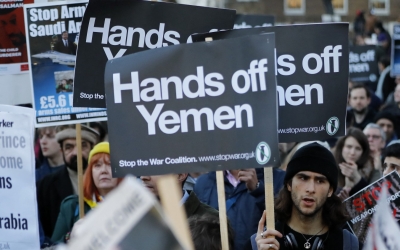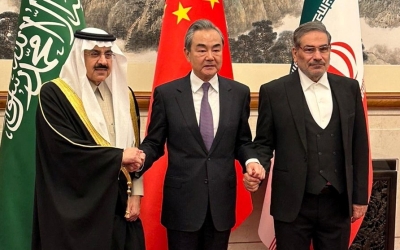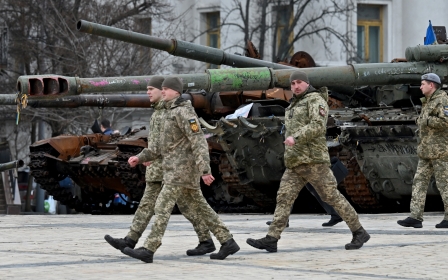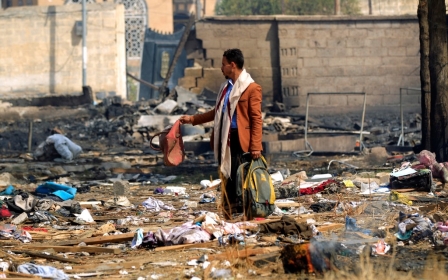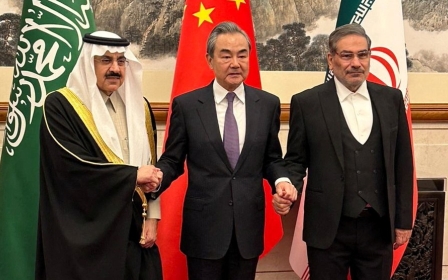War in Ukraine adds another layer of suffering for millions in Yemen
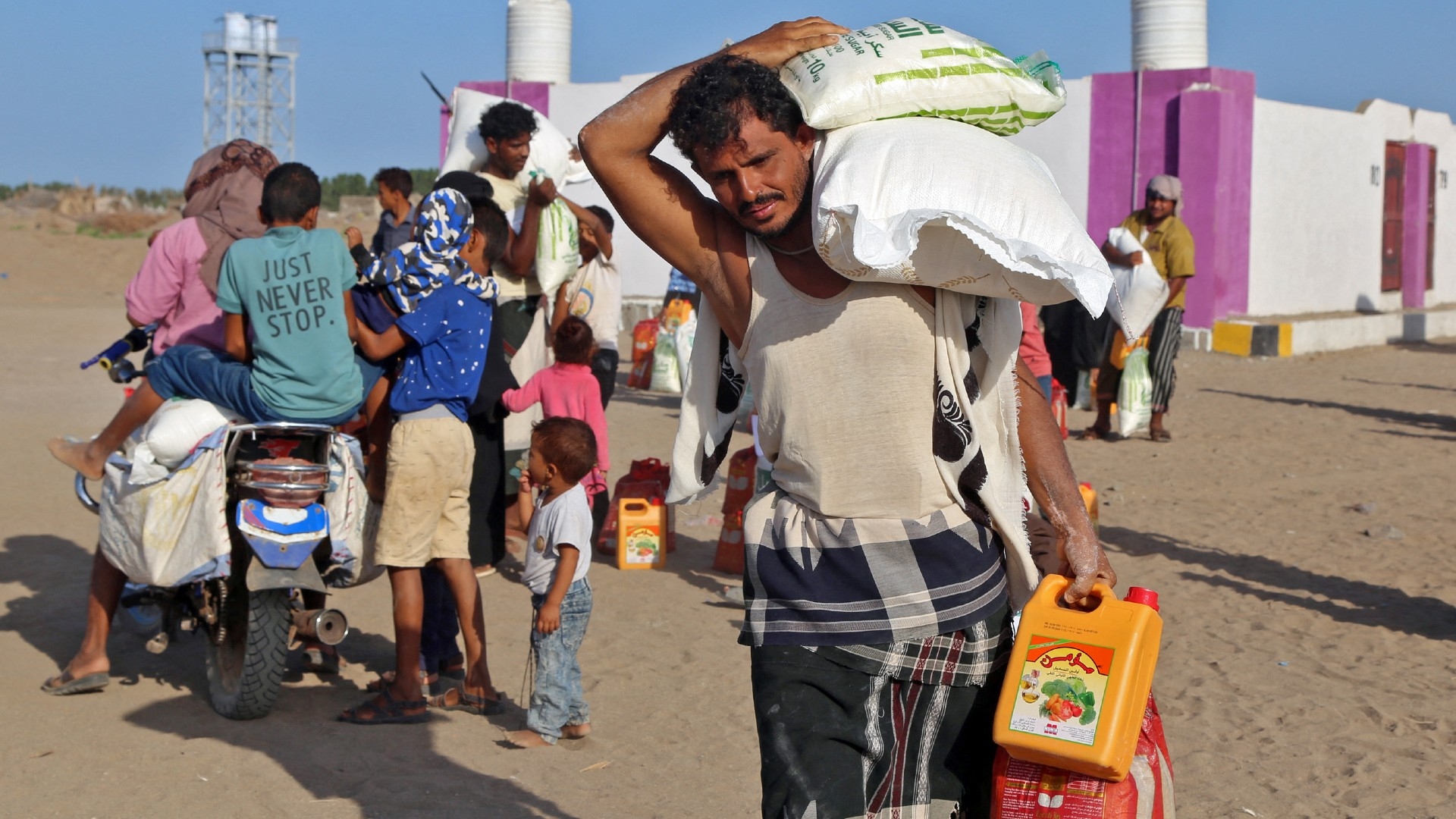
During the first few weeks of the war in Yemen, Muhammad Naji knew his family would be pushed to the brink.
As bombs rained down on the Yemeni capital Sanaa, his family, like millions of others, hunkered down in the hope of making it through nights marked by devastating air strikes.
As Saudi-led air attacks laid waste to residential buildings, mosques, markets, factories, schools and hospitals; families such as his survived on whatever they could - usually morsels of food, even mouldy bread.
Now, despite a recent lull in fighting, Naji once again finds his family struggling to survive.
Sharp increases in the cost of food, fuel and other key commodities due to Russia's invasion of Ukraine have pushed millions of Yemenis like him to go hungry every night.
"I can't believe that a conflict taking place elsewhere is further disrupting our lives," Naji told Middle East Eye.
Across the country, Yemenis are struggling to secure even the most basic staples in view of soaring prices triggered by Russia's invasion of Ukraine last year.
Both Russia and Ukraine account for a third of global wheat and barley exports and are also top exporters of other grains and sunflower seed oil used for cooking.
Naji, a state-contracted bus driver, said the high cost of basic staples meant he, like many of his colleagues, were forced to slash the number of meals they ate.
"We were already struggling to eat when the [Russia-Ukraine] war erupted, but now... things are worse. We're back to eating less than two meals a day."
He added that many Yemenis he knew adopted negative coping mechanisms to survive.
Many were forced to buy on debt or take out loans from friends or families to pay for basic food items and medicines. Others had sold their assets, including livestock, property or machinery.
Ukraine crisis
Yemen has always relied heavily on imports, with around 90 percent of its food coming from abroad, including 85 percent of its staple grain crops.
But with airports, ports and land routes closed, either due to damage or blockades by the Saudi-led coalition at war with Yemen's Houthi rebels, prices of basic goods have skyrocketed.
Last year, the World Food Programme (WFP) said it was forced to take food from the hungry to give to the starving due to a fall in funding.
"The Ukraine crisis makes a bad funding situation worse," said Corinne Fleischer, WFP regional director for the Middle East and North Africa.
"There are immediate humanitarian needs that demand attention. Donors have in recent years helped us provide food to millions in the region. Now the situation is critical and it's time to be even more generous."
Rasheed al-Haddad, a Sanaa-based economic analyst, said the toxic combination of the war in Ukraine and the drop in donor funding meant fewer Yemenis were able to access enough food to survive.
He noted that with Yemen importing 4.2 million tonnes of wheat from abroad, around 45.3 percent of the country's total imports came from Russia and Ukraine.
"Among the repercussions [of the Russia-Ukraine war] is the high cost of sea freight for imports," said Haddad, adding that the price of wheat, flour and vegetable oil had doubled.
"On the consumer level, it raised the level of suffering of citizens. And this has coincided with the decline in the amount of humanitarian aid provided by the United Nations and its partners," he added.
Saudis seek exit
Nine years after launching its military campaign in Yemen, analysts say Saudi Arabia wants to extricate itself from the brutal conflict.
Earlier this month, the kingdom announced plans to resume ties with Iran after attending Chinese-brokered talks in Beijing.
Analysts have said the agreement has potentially wide implications for the Iran nuclear deal and the war in Yemen, where the two sides are locked in a proxy war.
"Saudi Arabia is betting that deals with Iran and the Houthis will allow it to extricate itself from Yemen. But that is shortsighted at best," said Gregory D Johnson, a non-resident fellow at the Arab Gulf States Institute in Washington (AGSIW) and a former member of the UN Panel of Experts on Yemen.
"The Houthis aren't about to stop fighting their rivals in Yemen, no matter what deal the group signs with Saudi Arabia," he wrote. "And that reality is dangerous for the kingdom, which could easily find itself sucked back into the conflict in Yemen."
Yemen descended into conflict in 2014, when the Iran-aligned Houthis seized the capital, Sanaa, forcing the internationally recognised government to flee to Saudi Arabia. Riyadh and a coalition of regional allies, chiefly the UAE, intervened on 26 March 2015 to push the Houthis back.
Since then, the Saudi-led coalition has carried out more than 22,000 air strikes in an effort to roll back the Houthis' gains, with one-third striking non-military sites, according to the Yemen Data Project.
The Houthis have targeted Saudi and Emirati cities and infrastructure with drones and missiles.
A UN-brokered ceasefire that took effect last April brought a sharp reduction in hostilities. Even though the truce expired in October, fighting has largely remained on hold.
While analysts have suggested that Riyadh's top priority is securing border areas and stopping drone and missile attacks that have targeted its all-important oil facilities, Naji said he simply hoped the grinding conflict wouldn't put his family at any further risk.
"I can't allow for my family to become another statistic in this conflict," Naji said. "We Yemenis have gone through enough."
Middle East Eye propose une couverture et une analyse indépendantes et incomparables du Moyen-Orient, de l’Afrique du Nord et d’autres régions du monde. Pour en savoir plus sur la reprise de ce contenu et les frais qui s’appliquent, veuillez remplir ce formulaire [en anglais]. Pour en savoir plus sur MEE, cliquez ici [en anglais].


